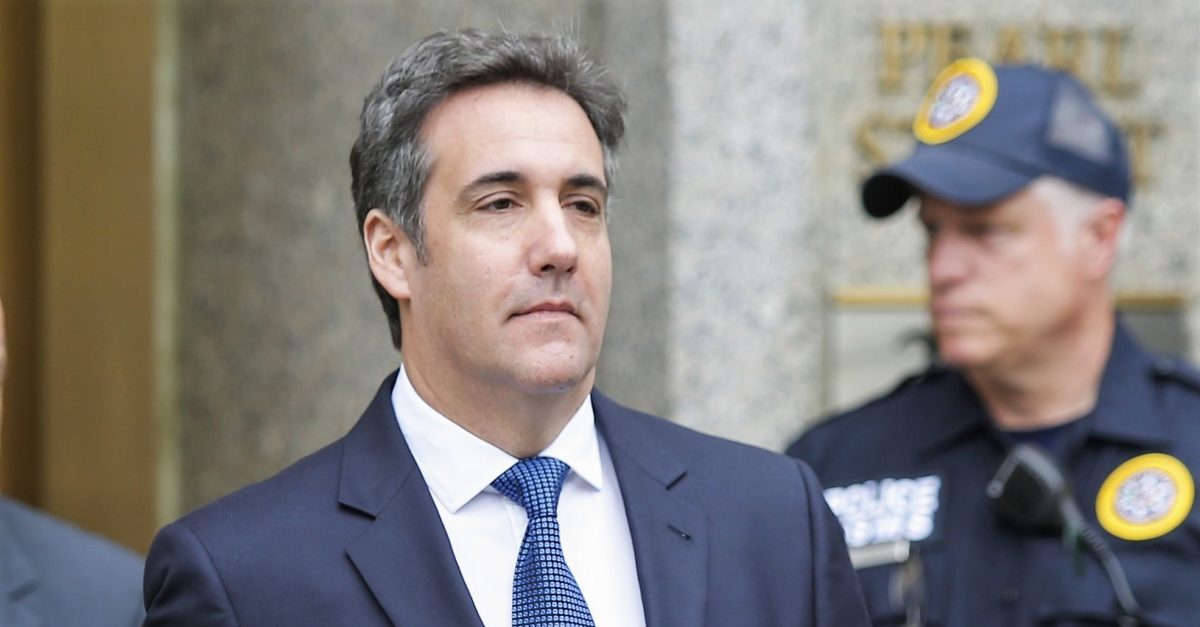
Alan Dershowitz says he’s not President Donald Trump’s lawyer – we accept that, although he sure sounds like it. Still, given the blur of Rudy Giuliani’s scattershot defense of his client, the president, Dershowitz’s far-more-consistent “defense” is surely far more persuasive. Still, is he right that Michael Cohen has every reason to pad his story to the authorities to market himself to be a “Team USA” cooperator, by “singing” and “composing” in Dershowitz’s terms?
Now, we are repeatedly told that Cohen doesn’t – at least, yet – have a cooperation agreement with the prosecutors. Why not? Maybe, he hasn’t yet “given it up” sufficiently for the prosecutors’ tastes. Maybe, but unlikely, the prosecutors don’t need (read “want”) him – maybe his credibility problem is too much for the prosecutors. Maybe the cooperation deal the prosecutors have insisted on has been too onerous, especially given New York State’s investigation of Cohen. Maybe, Lanny Davis’ unique brand of plea negotiations – essentially conducted over the airwaves, has sufficiently pissed off the prosecutors, and they’re playing harder hardball that usual. (In fact, Davis has now had to walk back his somewhat extravagant proffer of Cohen’s witness potential). Prosecutors are also human.
Maybe, despite his willingness to point his finger at Trump in open court when he pleaded guilty, Cohen won’t, at least as yet, also accuse other wrongdoers with whom he may have conspired (Russians?). Let’s face it, a skilled prosecutor won’t negotiate a plea agreement where the cooperator tells what he wants, rather than tells all.
But on the night that Cohen pleaded guilty, Dershowitz “debated” with the estimable former Southern District prosecutor Jennifer Rodgers on Chris Cuomo’s CNN program, Dershowitz argued that Cohen had every incentive to tell the prosecutors “what they want to hear,” even without currently having a cooperation agreement. Dershowitz’s argument appears to be that when Cohen said that Candidate Trump knew about the illicit payments, Cohen could easily have “embellished” the truth – and basically says that he did, partly because the prosecutors had already believed, without a word yet from Cohen, that the president is indeed guilty of wrongdoing. How better, then, to show that willingness to cooperate than to “give them something extra” (even if, as Dershowitz posits, it is untrue).
Now, of course, the prosecutors absolutely believe – nothing wrong there – that the president is guilty of something that Cohen has information about. It’s also true that any person will more readily accept what they’re told if predisposed to believe it. Prosecutors, notwithstanding their higher obligations to truth finding, are human, and the same psychological realities apply to them. So with Rudy Giuliani’s ridiculous contention that “truth isn’t truth”, there is much to be said for Dershowitz’s proposition that Cohen would be capable of persuading the prosecutors that the president directed him to make “deals” with his former inamoratas.
But Rodgers says something far different – the simple fact is that when Cohen stood up in court and swore that Trump knew about the payments, there was no cooperation agreement. If there were, then Cohen, his attorneys and the prosecution would all have been misleading the judge – in every plea hearing, the judge asks directly if there is any other or additional agreement between the defendant and the prosecutors beyond the written agreement. So not only would Cohen have been swearing falsely under oath (a separate crime) if he denied there was an agreement to cooperate when one was in place, but his attorneys and the prosecutors would also have been misleading the court.
Now, is there a wink and a nod as Dershowitz argues? Do the prosecutors have some basis to believe that Cohen or they, or both, will “come around”? For sure. Do we agree with Davis’ approach to try to persuade the prosecutors by teasing the public in suggesting that Cohen has information to give? Absolutely not! But is Cohen nonetheless incentivized to tell the prosecutors what they already believe in their hearts; and do would-be cooperators, as Dershowitz says, often “embellish” to make their story more marketable? You bet. Cohen has every motive to tell the prosecutors what they want to hear; but he should also know – his lawyers certainly do – that if he goes “too far” he will end up in government housing for much longer than if he simply told the truth and swallowed his medicine.
Dershowitz is correct – if Cohen testifies for the government he will get a much lighter sentence. But Rodgers, is also right – don’t assume Cohen and the government have some unspoken understanding. Dershowitz goes way too far when he says there is an “implicit cooperation agreement.” Is Cohen “hopeful” that he will get one, and are the prosecutors “hopeful” that he will accept the one they finally propose? Very likely. But if there was already something “in place,” as strongly urged by Dershowitz, both the prosecutors and Cohen’s lawyers belong before the disciplinary committee for having silently mislead the judge (Cohen is already effectively disbarred based on his guilty plea).
Yes, Cohen is indeed incentivized to tell prosecutors what they believe transpired between Cohen and Candidate Trump – and he is incentivized to do so even without any cooperation agreement in place. But Rodgers is right on the money – we shouldn’t take this all too far. Would prosecutors have left the door wide open to continue negotiations? They should be out of a job if they didn’t.
Joel Cohen practices white collar criminal law at Stroock & Stroock & Lavan LLP and is an adjunct professor at Fordham Law School. He is the author of Blindfolds Off: Judges on How They Decide and Broken Scales: Reflections on Injustice. Dale Degenshein is special counsel at Stroock and contributed to Broken Scales.
[Image via Eduardo Munoz Alvarez/Getty Images]
This is an opinion piece. The views expressed in this article are those of just the author.